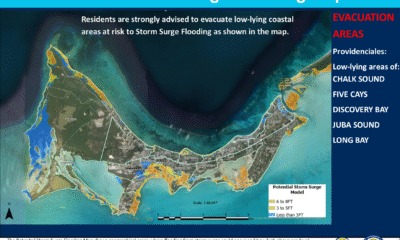Bahamas News
BAHAMAS:Attorney General’s Office: Public Statement on FATF ICRG Announcement
Published
7 years agoon

#Nassau, October 30, 2018 – Bahamas – The Caribbean Financial Action Task Force (CFATF) conducted a mutual evaluation of The Bahamas during an onsite visit (November 30, 2015 to December 11 2015). The Bahamas’ CFATF Mutual Evaluation Report (MER) was approved at the May 2017 CFATF Plenary in Trinidad and Tobago. The report provided a summary of the AML/CFT measures in place in The Bahamas, analysis of the country’s level of compliance with the FATF 40 Recommendations, the level of effectiveness of the AML/CFT regime, and provided recommendations on how the regime could be strengthened.
 Results of the CFATF MER reflected that the country received ‘largely compliant or compliant’ ratings in 18 of the 40 FATF Recommendations, while posting ‘partially compliant’ ratings in 21 FATF Recommendations and ‘non-compliant’ rating in one (1) FATF Recommendation.
Results of the CFATF MER reflected that the country received ‘largely compliant or compliant’ ratings in 18 of the 40 FATF Recommendations, while posting ‘partially compliant’ ratings in 21 FATF Recommendations and ‘non-compliant’ rating in one (1) FATF Recommendation.
Following the publication of The Bahamas’ CFATF MER in July 2017, the National AML/CFT Action Task Force (Task Force) commenced an ambitious plan to address all of the deficiencies noted in the 2017 MER, particularly to complete the National Risk Assessment (NRA), which examined the money laundering and terrorist financing risks in the financial services sector both domestic and international, and to gain the government’s approval of same. Emanating from the NRA and the CFATF MER were gaps regarding the country’s AML/CFT Framework (legal, supervisory/regulatory, and enforcement regimes). The Task Force was charged with the responsibility of developing a National Identified Risk Framework Strategy (NIRFS) inclusive of AML/CFT/PF regimes. The NRA was approved by government in December 2017 and the NIRFS was approved in April 2018.
Among the deficiencies noted also was the absence of a legal regime that was capable of addressing the identified risks which were illuminated by the NRA. In order to address this the government embarked on an ambitious legislative reform agenda.
Both internationally and regionally, The Bahamas has been praised for its significant efforts and achievements over the last 15 months to address deficiencies identified in its CFATF MER. During this period of time the Attorney-General and the Task Force he leads have attained many of the goals they established post the 2017 publication of the country’s CFATF MER. Notably –
- Since July 2017, the authorities have enacted the following legislative measures:
(i) The International Tax Cooperation Amendment Act, 2018, Automatic Exchange of Information Amendment Act, 2018 and Automatic Exchange of Information Amendment Regulations 2018 which resulted in the signing of the MCA and MCAA;.
(ii) The legislative amendment of the National Constitution to create the Independent Office of the Director of Public Prosecutions.The mandate of the ODPP as an independent prosecutorial Authority is to provide efficient, effective, fair and just prosecutorial services within the Commonwealth of The Bahamas. Noteworthy is the progress made with money laundering investigations, prosecutions and convictions – during the period July 2017 – September 2018, during which 40 money laundering prosecutions were recorded with 19 convictions compared with one (1) money laundering case recorded for the previous period;
(iii) The Financial Transactions Reporting Act (FTRA), also passed in 2018 addressed technical gaps identified in the Bahamas’ CFATF MER;
(iv) The Proceeds of Crime Act (POCA), 2018 addressed technical gaps identified in the Bahamas’ CFATF MER -with provisions such as the introduction of Unexplained Wealth Orders, Civil Forfeiture and the establishment of the Identified Risk Framework (IRF) oversight bodies – the Ministerial Council (National Identified Risk Policy Body), the Identified Risk Steering Committee (an operational IRF multi-agency body responsible for implementation and enforcement of the IRF);
(v) Anti-Terrorism Act (ATA), 2018) addressed the technical gaps identified in the CFATF MER and IO 10 and IO 11. Notable provisions address the financing of terrorism, financing of proliferation of WMD, manufacturing of WMDs, all forms of terrorism and participation in terrorist activities, identification of the competent authority dealing with terrorist issues (Attorney-General), local and international listing of terrorists and terrorist organization, and international cooperation. Attention was given to ensuring that the requirements of Recommendation 6 and 7 of the FATF 40 Recommendations and IO 10 and IO 11 were addressed; and
(vi) The Travellers’ Currency Declaration (Amendment) Act, 2018. The provisions of this Act mandate currency declaration at the borders by departing and arriving passengers. These provisions along with those of the Travellers’ Currency Declaration Act, 2015 came into force by 1st September 2018. This legislation obligated all travellers to declare currency, negotiable instruments, precious metals and stones equal or exceeding $10,000.
The Government further enacted a number of Regulations (which have the force of Law) in order to address other noted deficiencies:
- b) Regulations released by the Government include:
(vii) Financial Transactions Reporting Regulations, 2018 which establishes the thresholds for customer due diligence set out in the FATF 40 recommendations, customer due diligence requirements for companies, trusts and legal persons, and establishes STR filing obligations on general insurers.
(viii) Financial Transactions (Wire Transactions) Regulations, 2018 which incorporated the provisions of the 2015 Regulations and increased administrative penalties for non-compliance with the requirements of the Regulations.
- ix) International Obligations (Economic & Ancillary Measures) (Implementation of United Nations Security Council Resolutions) Iraq Order, 2018, which enforces all provisions of the UN Security Council’s mandated targeted sanctions on Al’Qaida, I’Sil and related entities and associated parties. Order to come into force on 11 October 2018;
 (x) International Obligations (Economic & Ancillary Measures) (Implementation of United Nations Security Council Resolutions) Afghanistan Order, 2018, which enforces all provisions of the UN Security Council’s mandated targeted Sanctions on Al-Qaida, I’Sil and related entities and associated parties. Order to come into force on 11 October 2018;
(x) International Obligations (Economic & Ancillary Measures) (Implementation of United Nations Security Council Resolutions) Afghanistan Order, 2018, which enforces all provisions of the UN Security Council’s mandated targeted Sanctions on Al-Qaida, I’Sil and related entities and associated parties. Order to come into force on 11 October 2018;
Additionally the Central Bank of The Bahamas and other financial sector Regulators issued the following Guidance Notes:
- c) Regulatory guidance issued to the financial institutions and designated non-financial businesses and professions:
(xi) As of August 2018, The Central Bank (CBB) has updated its Guidelines for Supervised Financial Institutions on the Prevention of Money Laundering and Countering the Financing of Terrorism (AML/CFT Guidelines) to align with the NIRFS and address the deficiencies highlighted in The Bahamas’ Mutual Evaluation Report (MER);
(xii) As of August 2018, the Group of Financial Services Regulators – CBB, Insurance Commission Board (ICB), Securities Commission Board (SCB), Gaming Board (GB) and Compliance Commission (CC) jointly issued the following guidance notes;
- Guidance Note on the Sound Management of Risks Related to Financial Crime in The Bahamas; and
- Guidance Note on Proliferation and Proliferation Financing.
The guidance notes provide direction to regulated entities on the identification, assessment, management and mitigation of financial crime risk and raise awareness of the risks and vulnerabilities in regards to proliferation and proliferation financing.
(xiii) The Compliance Commission issued revised and enhanced Codes of Practice for Lawyers, Accountants and Real Estate Brokers and Developers.
Note is made that the Insurance Commission of The Bahamas, the Gaming Board and the Securities Commission of The Bahamas have drafted updated AML/CFT Guidelines for their licensees and registrants which are due for release by month end October 2018. The guidelines are being updated to address key deficiencies noted in the MER, and to take into account the enhanced provisions contained in the FTRA 2018, POCA 2018 and ATA 2018.
- d) Development and implementation of Risk Based Supervision:
(xiv) The Central Bank, having developed and implemented risk based supervision for its substantive licensees (banking and trust companies) in last quarter of 2009, incorporated credit unions into its risk based framework in the second quarter of 2018 and has completed the risk profiling of all 10 credit unions as of July 2018.
(xv) The Securities Commission of The Bahamas, developed and implemented risk based appropriate supervision for securities licensees and registrants. The risk profiling of al licensees is ongoing. Note is made that SCB’s risk based supervision has been ongoing for Financial and Corporate Service Providers since 2014.
The Compliance Document
The FATF recently listed The Bahamas in the ‘Compliance Document’ following its October 2018 Plenary in France. The same is not a “Black List”, but a monitoring list; as the country is working to implement fully the provisions of the newly enacted POCA, 2018, FTRA, 2018, and ATA, 2018. It has been recognized even in the context of the Compliance Document, that The Bahamas has in a very short period of time since May 20017, made significant and important progress towards fully addressing all deficiencies noted in the 2017 MER.
The terms of the short “Action Plan” adopted by the FATF Plenary in Paris this month clearly indicates that all required now of The Bahamas is the production of evidence to support the effective implementation of the vigorous AML/CFT and Counter-identified risk legal framework which has now been created by the legislative framework, the NRA and subsequent AML/CFT Guidance Notes referred to above. Issues related to the availability of beneficial ownership information are being addressed concurrently with the Bahamas’ commitment to the Base Erosion and Profit Shifting (BEPS) project of the European Union.
This task will necessarily involve the installation of case management software to better track international cooperation efforts, coupled with the installation of analytical software to improve the outcomes of the Financial Intelligence Unit in its response to both domestic and international Suspicious Transactions Reports and requests for intelligence-based assistance.
 The Bahamas has formally communicated a high level of political commitment and will to address the remaining implementation issues and have noted that within the international and regional AML/CFT/PF organizations, there has been favorably recognition of the tremendous effort that The Bahamas has expended to enable it to be the first of the countries (Trinidad & Tobago, Jamaica, Barbados, Antigua and Barbuda) in the Fourth Round CFATF Mutual Evaluations, to request re-rating of its legal provisions to address FATF Recommendations. Note is also made that all countries having undergone the Fourth Round CFATF Mutual Evaluations are confronting new standards on ‘Effectiveness Ratings’ and substantial challenges in ensuring that ‘sufficient progress’ is being made to comply with these newly introduced international standards. The Bahamas is committed as a member of the international financial community, to implement and maintain an appropriate, effective NIRF which incorporates its AML/CFT/PF regime.
The Bahamas has formally communicated a high level of political commitment and will to address the remaining implementation issues and have noted that within the international and regional AML/CFT/PF organizations, there has been favorably recognition of the tremendous effort that The Bahamas has expended to enable it to be the first of the countries (Trinidad & Tobago, Jamaica, Barbados, Antigua and Barbuda) in the Fourth Round CFATF Mutual Evaluations, to request re-rating of its legal provisions to address FATF Recommendations. Note is also made that all countries having undergone the Fourth Round CFATF Mutual Evaluations are confronting new standards on ‘Effectiveness Ratings’ and substantial challenges in ensuring that ‘sufficient progress’ is being made to comply with these newly introduced international standards. The Bahamas is committed as a member of the international financial community, to implement and maintain an appropriate, effective NIRF which incorporates its AML/CFT/PF regime.
Release: Office of the Attorney General and Ministry of Legal Affairs
You may like
Bahamas News
Walker Confirmed as U.S. Ambassador to The Bahamas: A Partner in America’s Extended Family
Published
3 weeks agoon
October 14, 2025
By Deandrea Hamilton | Magnetic Media
The United States and The Bahamas share more than proximity — they share a bond of history, trade, and culture that Washington’s newest diplomat calls “part of America’s extended community.”
Now, for the first time in 14 years, the U.S. Embassy in Nassau will again be led by a Senate-confirmed ambassador. Herschel Walker, the Heisman-winning football legend turned entrepreneur, has been confirmed by the U.S. Senate as America’s official envoy to The Bahamas.
Walker, who will oversee one of the Caribbean’s most strategically positioned U.S. missions, told senators during his confirmation hearing that The Bahamas will play a key role in upcoming U.S. 250th Independence celebrations. “The Bahamian people,” he said, “will be included in this milestone year, because our stories are intertwined — through family, trade, and friendship.”
While his nomination was unconventional, his priorities are anything but vague. Walker vowed to counter growing Chinese influence in the Caribbean, calling Beijing’s investments in Bahamian deep-water ports “a direct threat to U.S. national security.” He pledged to work closely with Bahamian authorities to ensure American interests remain the region’s cornerstone.
“There’s a rise in drug smuggling in The Bahamas, and this is a real danger to the United States,” Walker said, referring to the Operation Bahamas, Turks and Caicos (OPBAT) partnership. He promised to strengthen intelligence sharing, joint patrols, and law enforcement coordination to disrupt trafficking routes that have grown increasingly sophisticated.
But Walker also emphasized opportunity over fear — signaling that his ambassadorship will not only focus on security, but on strengthening The Bahamas as a gateway for U.S. investment, trade, and tourism.
“I will advise the American business community of the vast investment opportunities that exist in The Bahamas,” he said. “And I will make sure the Bahamian government maintains an environment where U.S. companies can invest confidently — because America must prove it is still great as an investor.”
For a small island nation sitting less than 50 miles off the coast of Florida, this renewed diplomatic attention carries weight. Since 2011, the post of U.S. ambassador had remained vacant — a gap that many observers say weakened direct ties, delayed joint security initiatives, and allowed other powers to move in.
Walker’s confirmation — approved 51 to 47 — ends that silence. And with it comes the expectation that this former Olympian and business owner will translate his discipline, charisma, and resilience into diplomatic results.
Critics question his lack of foreign policy experience, but Walker counters with confidence: “Throughout my life, people have underestimated me. I’ve always proved them wrong — by outworking everyone.”
As he prepares to take up residence in Nassau, Walker says his mission is simple: rebuild trust, deepen cooperation, and remind both nations that their futures are tied not just by geography — but by shared purpose, mutual respect, and the enduring ties of community.
Angle by Deandrea Hamilton. Built with ChatGPT (AI). Magnetic Media — CAPTURING LIFE.
Bahamas News
PAY STANDOFF: Prime Minister Cancels Talks as Unions Warn of More Protests
Published
3 weeks agoon
October 13, 2025
By Deandrea Hamilton | Magnetic Media
Monday, October 13, 2025 — Nassau, The Bahamas – What began as a calm holiday meeting has spiraled into a full-blown standoff between The Bahamas Government and two of the country’s most powerful public sector unions — the Bahamas Union of Teachers (BUT) and the Bahamas Public Services Union (BPSU) — after the Prime Minister abruptly cancelled follow-up talks set for Tuesday, blaming public comments made by union leaders.
The announcement of the cancelled meeting came late Monday, just hours after a tense sit-down at the Office of the Prime Minister, held on National Heroes Day, where both BUT President Belinda Wilson and BPSU President Kimsley Ferguson accused the government of dragging its feet on salary increases and retroactive pay owed to thousands of public officers.
Wilson, never one to mince words, said the Prime Minister’s “technical officers” — the very people responsible for executing his instructions — were failing to carry out his directives regarding payment timelines.
“The Prime Minister’s issue,” Wilson said, “is that he has persons working for him who are not following his instructions. If those officers would follow through on what he told them to do, we wouldn’t be here today.”
Wilson added that the BUT and other unions are demanding retroactive pay dating back to September 2024, and that all increases be applied and paid by the October payday, not December as previously stated by the Prime Minister.
“Senior civil servants already received their retroactive pay — thousands of dollars — backdated to September of last year,” Wilson charged. “We’re saying the small man deserves the same. This isn’t a gift. It’s money already earned.”
Her comments came after the government publicly insisted that the salary adjustments would be implemented by December 2025, just ahead of Christmas — a timeline unions flatly reject as too slow.
Ferguson: ‘No More Excuses’
Following Wilson, BPSU President Kimsley Ferguson delivered a fiery statement of his own, telling reporters the unions would no longer tolerate delays or mixed messages from the Davis administration.
“The Prime Minister was receptive — but we’re not accepting excuses,” Ferguson said. “If the Prime Minister’s having a memory lapse, we have the Hansard from Parliament to remind him exactly what he promised public officers.”
Ferguson went further, warning that if Tuesday’s meeting failed to produce results, unions would “visit the House of Assembly” and intensify their campaign for immediate payment.
“Public servants, ready yourselves,” he declared. “We are prepared to stand together — all across The Bahamas — until our needs are met.”
Now, with the Prime Minister cancelling tomorrow’s talks altogether, that threat appears closer to becoming reality.
Government Bungles Response
Observers say the administration’s handling of the matter has been confused and contradictory, with conflicting statements on payment timelines and poor communication fueling frustration among teachers, nurses, and general public officers.
The government has maintained that the funds are allocated and will be disbursed before year’s end, but unionists insist they’ve heard it all before — and this time they want results, not promises.
The Prime Minister’s decision to cancel the meeting, rather than clarify or de-escalate tensions, has drawn sharp criticism across social media and among rank-and-file civil servants who see the move as punitive and dismissive.
Slowdown and the Threat of Another Mass Protest
Across several ministries, departments, and schools, reports are already surfacing of a go-slow in the public service, as workers express solidarity with the unions’ demands.
Many believe another mass demonstration is imminent, similar to the one staged last week Tuesday when thousands of workers gathered outside the House of Assembly on Bay Street as Parliament reopened after summer recess.
That protest brought parts of downtown Nassau to a standstill as union members sang, marched, and even sat in the street — a powerful show of defiance that now threatens to repeat itself unless the government moves quickly to resolve the impasse.
A Political Flashpoint
What began as a straightforward salary dispute has now evolved into a test of credibility and competence for the Davis administration. With a restless public sector, rising inflation, and unions unified across professions, the government risks not only another protest — but a full-blown industrial crisis heading into the year’s end.
For now, the unions are standing firm: they want retroactive pay from September 2024 and full salary adjustments by this October. Anything less, they warn, could push the country’s workforce from a slowdown into open confrontation.
Angle by Deandrea Hamilton. Built with ChatGPT (AI). Magnetic Media — CAPTURING LIFE.
Bahamas News
Nassau Cruise Port Marks Sixth Anniversary with Exciting New Additions for Visitors and The community
Published
4 weeks agoon
October 8, 2025
[Nassau, Bahamas, October 8, 2025] Nassau Cruise Port (NCP) proudly celebrates its sixth corporate anniversary by unveiling a series of transformative additions that further enhance the guest and community experience. The anniversary comes at a pivotal moment in the growth of the port, with the opening of a new swimming pool, an expanded marina, and a state-of-the-art ferry terminal that will support transfers to the Royal Beach Club, which is currently under construction on Paradise Island.
Since its $300 million redevelopment, Nassau Cruise Port – the largest transit cruise port in the world – has welcomed millions of visitors and become one of the most vibrant cruise destinations in the world. This anniversary not only reflects its commitment to delivering world-class facilities, but also its dedication to creating meaningful connections between visitors and the Bahamian community.
“This milestone represents much more than the passage of time,” said Mike Maura, Jr., CEO and Director of Nassau Cruise Port. “It reflects our promise to continually elevate the guest experience, contribute to the local economy, and provide opportunities for Bahamians. During our first year (2019) of operating the Nassau Cruise Port, Nassau welcomed approximately. 3.85 million cruise guests, and 2025 will see well over 6 million cruise visitors visit Nassau. Our focus on driving cruise tourism and the $350 million investment in our downtown waterfront is a testament to our vision of making Nassau a premier cruise and leisure destination.”
The new pool offers a refreshing retreat for visitors enjoying Nassau’s waterfront, while the expanded marina will accommodate additional yachts, boosting tourism and local commerce. The ferry terminal expansion enhances passenger flow and supports convenient, seamless transfers to the Royal Beach Club, strengthening Nassau’s position as a hub for Caribbean cruising and leisure.
As part of its anniversary celebrations, NCP will host a series of internal and external activities to celebrate its team and to highlight its ongoing investments in the Bahamian economy, including job creation, local vendor opportunities, and cultural showcases at the port.









